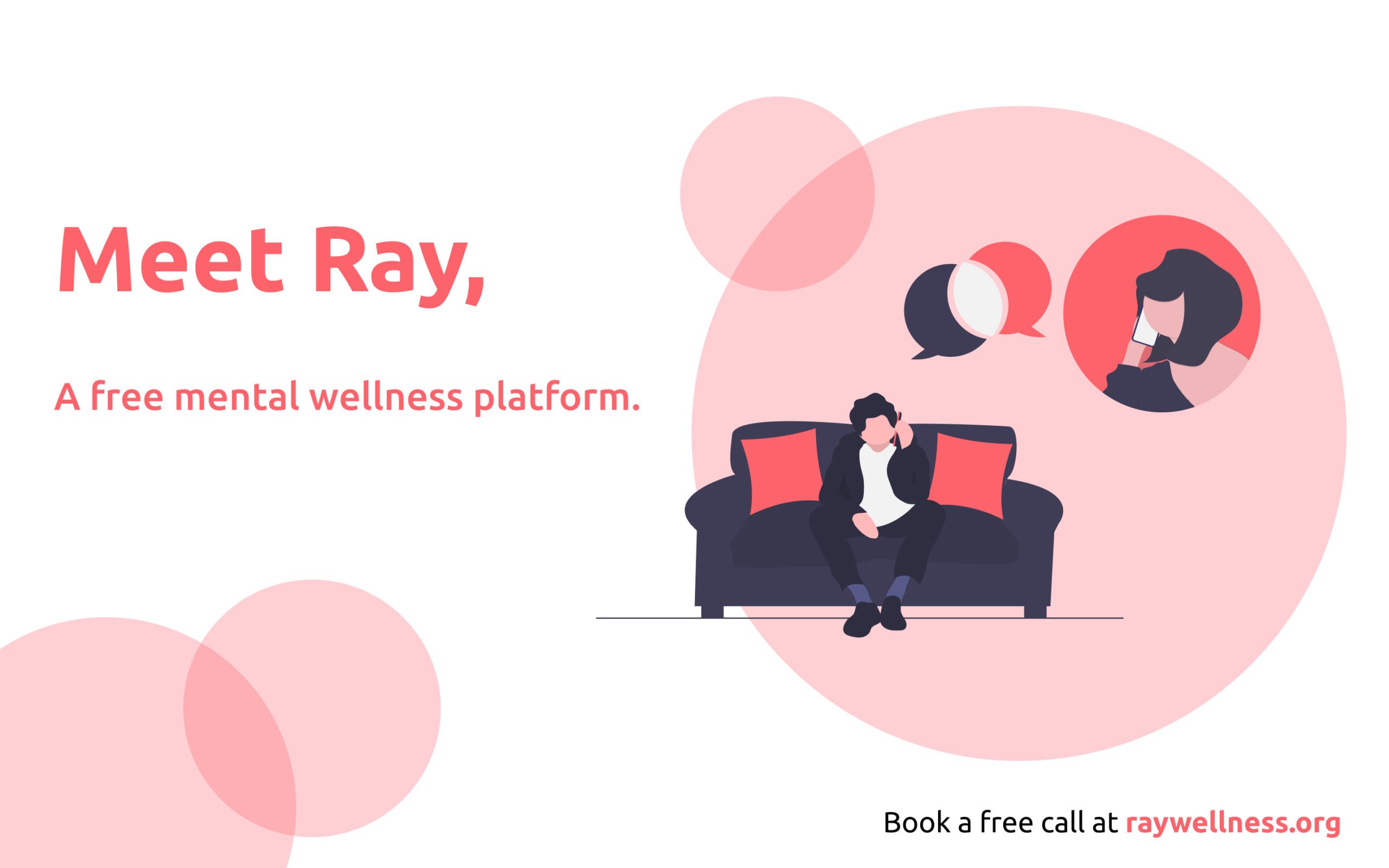Two Stanford juniors have launched a mental wellness platform that connects users with trained volunteers for free 1-on-1 support sessions.
The platform, Ray, has a team of volunteer “supporters” with backgrounds in peer counseling, crisis counseling and wellness support. The volunteers work to provide a safe space for individuals dealing with stress, anxiety and social isolation due to COVID-19.
Ray is designed to be accessible for all users, explained Kasey Luo ’21, who co-founded the platform along with Mika Isayama ’21.
“If you’re someone looking for mental wellness support, all you have to do is go to our site, provide an email and an alias and book a call,” Luo wrote in an email to The Daily. “Only your alias is shared with your supporter. It’s completely free and you do not need to make an account.”
Luo said that her inspiration for Ray came from seeing COVID-19’s psychological impacts during her time as a crisis counselor for Crisis Text Line, a global nonprofit organization that provides free mental health texting services
“Oftentimes, it’s those who are most negatively impacted by the virus who also don’t have the resources to access the support they need,” Luo wrote. “For example, traditional forms of therapy can average $120/session, which is out of reach for many people, especially those from uninsured, low-income or stigmatized backgrounds.”
Work on the project began in April. At Mozilla’s Fix-the-Internet Incubator, an eight-week program supporting projects aimed at improving the internet, Luo and Isayama were able to win grants and meet two engineers. Their team also includes two faculty advisors: Larry Davidson, director of the Yale Program for Recovery and Community Health, and Tracy George, director of The Good Life Center and Yale Well Initiative. Ray is also in partnership with the COVID-19 Response Innovation Lab, The Rally Fund and Peace First.
Since April, Ray has gone through a pilot phase with Stanford students and is now expanding to the larger Stanford community as well as other universities.
“Our pilot launched just recently and we’re hoping to get as much feedback as we can to make it better,” Isayama wrote in an email to The Daily.
Pilot users provided positive feedback, Luo said.
“[My Ray Supporter] was really wonderful and I’m really happy that I got to have my session with her,” one pilot user wrote in a testimonial provided to The Daily. “She was very attentive and gave me good actionable mindful exercise to use after the session as well. I really appreciated her affirmation and great questions and acknowledgements. Would definitely […] schedule with her again!”
As of today, Ray has around 20 support volunteers who are “individually interviewed and trained in motivational interviewing, active listening and promoting wellness,” according to the project’s website. Motivational interviewing is a “counseling method that helps people resolve ambivalent feelings and insecurities to find the internal motivation they need to change their behavior,” according to Psychology Today.
The six-hour training also included sessions on the “the psychological impacts of COVID-19 … and a presentation that I led on best practices in communicating with people with anxiety and/or depression,” Ray research team member and counselor Angelique Dakkak ’16 told The Daily.
“I personally enjoyed getting to practice motivational interviewing with my fellow Ray supporters and having the space afterward to share my experiences and listen to others’ experiences of utilizing motivational interviewing,” Dakkak wrote. “At the training’s conclusion, I emerged feeling better and more confident in my abilities to conduct counseling sessions.”
She has previously worked as a counselor, a peer specialist for the National Alliance on Mental Illness (NAMI) and a support group facilitator for teenagers and young adults with depression and/or bipolar disorder. As an undergraduate at Stanford, she majored in psychology with a focus in clinical psychology.
“I wanted to give back to my community during these unusually challenging times,” Dakkak wrote in an email to The Daily. “I saw this as an opportunity to share my personal and professional experiences in a meaningful way.”
Volunteers fulfill various responsibilities ranging from interacting with clients to developing the project, Dakkak said. She works directly with clients to provide “a space that they can comfortably express their thoughts and emotions.” She is also working with other team members to add items to pre- and post-survey questionnaires to enhance Ray’s data.
Ray supporters meet weekly to debrief with advisors and other supporters, Dakkak said. These sessions allow for feedback, discuss obstacles and “opportunities for supporters to support and learn from one another.”
Ray’s next steps include expanding the user base and adding features to the website, according to Luo.
“Our ultimate goal is to reach uninsured, low-income, people of color and other stigmatized populations,” Luo wrote.
Isayama added that they are focusing on gathering as much feedback as possible to improve Ray.
“Our current focus is to spread the word about Ray to not only get more users to try our free service, but also get feedback from the people we want to help,” Isayama wrote. “After getting more user feedback, we’re hoping to launch our second prototype with new features that’ll improve the user experience of our site.”
Both Isayama and Luo mentioned that this process has been very motivating, and that they have learned a lot along the way.
“There’s been a lot of excitement and nervousness in every step of Ray, and a lot of ups and downs,” Isayama wrote. “One of the takeaways I’ve gotten from this bumpy journey is to embrace ambiguity by taking any challenge as a learning opportunity and being flexible with surprises. There are many times where we don’t know if we’re making the right decision or we are caught off-guard by something that happened unexpectedly, but being adaptive to changes have helped us come this far.”
Contact Ujwal Srivastava at ujwal ‘at’ stanford.edu.
